Legislature approves $4.7 billion spending bill for infrastructure
 After weeks of discussion and debate, the Legislature swiftly gave final passage this week to a spending bill that earmarks $4.7 billion for an array of infrastructure priorities and sectors.
After weeks of discussion and debate, the Legislature swiftly gave final passage this week to a spending bill that earmarks $4.7 billion for an array of infrastructure priorities and sectors.
MAC’s governmental affairs director, Deena Bosworth, applauded the passage, noting that much of the spending falls in line with priorities laid out by the Coalition for a Strong and Prosperous Michigan, which MAC helped form last fall to create a united plan for leveraging the state’s ARP funding in the most strategic way possible.
The coalition projects about $2.5 billion of the $4.7 billion in Senate Bill 565 aligns with its Michigan Prosperity Roadmap that recommended investments in five key areas: Infrastructure, Fiscal Health, Thriving Communities, Strong Economy, and Public Safety.
Of particular note in SB 565 is the massive investment in protecting Michigan’s waters, including $1.27 billion from federal ARP funds for grants for wastewater, stormwater and drinking water projects.
The bill also sends $250 million in federal funds into a broadband service grant program.
The investment package was approved by both the House and the Senate today and includes funding for water infrastructure, roads and bridges, broadband internet, housing assistance and more. Gov. Gretchen Whitmer signaled her support for the package and is expected to sign the bills when they arrive on her desk.
For more information on this issue, contact Meghann Keit-Corrion at keit@micounties.org.
Hundreds gather in Lansing for 2022 Legislative Conference
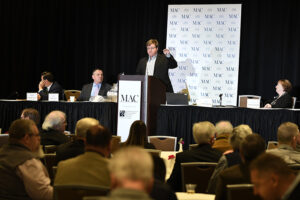
Eric Frederick of Connected Nation briefs attendees on broadband expansion plans in Michigan.
Nearly 300 county officials, vendors, policy experts and others gathered in Lansing this week for the 2022 Michigan Counties Legislative Conference, hosted by MAC, in association with the Michigan County Medical Care Facilities Council (MCMCFC).
During the three-day event, participants had access to a dozen policy workshops, heard from plenary speakers on the legislative situation in Lansing and the rapidly changing circumstances on broadband in Michigan and enjoyed ample networking time.
During his welcome address to county leaders, MAC Board President Phil Kuyers of Ottawa County said, “This morning, I want to focus – briefly – on my ‘revelation,’ if you will, from my service in this organization: The power of a personal relationship with your state lawmakers. If the lights weren’t bright, I’m sure I could see Deena and Meghann and Steve nodding their heads in unison. They have told me over and over again that the power of MAC is in our membership and in the efforts of that membership.”

MAC’s Meghann Keit-Corrion (left) and Deena Bosworth give the MAC Legislative Update.
“It was good to be back to an in-person event,” said Stephan W. Currie, executive director of the Michigan Association of Counties, which holds the event, in association with the Michigan County Medical Care Facilities Council. “And we had much to celebrate in honoring Sens. McBroom and Moss for their work last year on passage of four-year terms for county commissioners, a long-standing MAC goal.”
Click here to see presentation slides from the conference.
Follow the links below to see videos from three breakout sessions:
Check out the conference photo gallery.
MAC’s next conference will be the 2022 Annual Conference, Sept. 18-21 in Port Huron. Expect registration to open for that event in early July.
Legislative Reception honors lawmakers, raises money for MACPAC
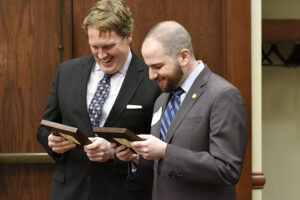
Sens. Ed McBroom (left) and Jeremy Moss inspect their County Advocate Awards at the Legislative Reception.
Sens. Ed McBroom (R-Dickinson) and Jeremy Moss (D-Oakland) were very special guests at the 2022 MAC Legislative Reception on Tuesday, as they were honored as 2022 County Advocate Award winners for their work in 2021 in passing four-year terms for county commissioners.
The senators were lauded by Governmental Affairs Director Deena Bosworth and Board President Phil Kuyers during a program that also included some “catch-up work,” the presentation of MAC’s 2020 County Advocate Awards that were disrupted by the pandemic. Honored for their work in 2019 were Sen. Roger Victory (R-Ottawa) and Reps. Sarah Lightner (R-Jackson) and Julie Alexander (R-Jackson).
Bosworth also praised Allegan County’s Jim Storey, a MAC Board member, for his long efforts and testimony in support of four-year term legislation.
To close the evening, Bosworth recognized donors to MACPAC who achieved Platinum, Gold or Silver status in 2021 or 2022.
During the reception and at other points during the 2022 Legislative Conference, MAC was able to raise nearly $1,300 from county officials for its efforts in 2022.
For the latest list of donors, click here. To make a quick and easy digital donation, click here.
Key funding bill for county medical facilities advances in House
 The House Health Policy Committee, chaired by Rep. Bronna Kahle (R-Lenawee), unanimously approved a three-year extension to the county maintenance of effort (MOE) rate for county medical care facilities (MCFs), a key legislative priority for the Michigan County Medical Care Facilities Council (MCMCFC).
The House Health Policy Committee, chaired by Rep. Bronna Kahle (R-Lenawee), unanimously approved a three-year extension to the county maintenance of effort (MOE) rate for county medical care facilities (MCFs), a key legislative priority for the Michigan County Medical Care Facilities Council (MCMCFC).
House Bill 5875, by Rep, Kahle, provides an extension to the MOE freeze until 2025, or until the Michigan Department of Health and Human Services (MDHHS) implements a new reimbursement model, whichever is sooner.
MDHHS has been studying and contemplating a new reimbursement model and policies for long-term care facilities. Should a new approach be implemented prior to Dec. 31, 2025, MCFs would transition to the new system under the bill.
Other organizations supporting the bill alongside MCMCFC include MAC, the Health Care Association of Michigan and Leading Age Michigan.
The Legislature will have a two-week break period, so the soonest a floor vote could occur is the week of April 11. MCMCFC and MAC will encourage swift action on it when legislators return to the Capitol.
For more information on this issue, contact Meghann Keit-Corrion at keit@micounties.org.
MDHHS schedules new webinars on opioid issues, starting April 5
 Following up on MAC’s recent Opioid Settlement Webinar and our conference breakout session, a new series of in-depth sessions on best practices in specific opioid response efforts will be offered to county leaders.
Following up on MAC’s recent Opioid Settlement Webinar and our conference breakout session, a new series of in-depth sessions on best practices in specific opioid response efforts will be offered to county leaders.
The Michigan Department of Health and Human Services (MDHHS), in partnership with the Attorney General’s Office, will be hosting this webinar series during April and May on the National Opioid Settlement.
All webinars will begin at 3 p.m. Please note the following dates and themes, with more detailed information to come.
- Recovery – April 5
- Harm reduction – April 19
- Treatment – May 3
- Prevention – May 17
Each webinar will cover a different topic on ways communities can maximize the impact of the opioid settlement funds.
The April 5 session will discuss roles of Recovery Community Organizations and Housing. The link to that webinar will be shared in the April 1 Legislative Update. No registration is required to attend.
For more information, contact Meghann Keit-Corrion at keit@micounties.org.
State announces marijuana funds for counties
 More than $21 million is being sent to 53 counties from fees paid by marijuana businesses in their jurisdictions, the Michigan Treasury announced this week.
More than $21 million is being sent to 53 counties from fees paid by marijuana businesses in their jurisdictions, the Michigan Treasury announced this week.
The county sum is part of the more than $42.2 million that’s being distributed among 163 local governments as a part of the Michigan Regulation and Taxation of Marijuana Act.
Next week, 62 cities, 15 villages, 33 townships and 53 counties will be receiving payments from the Marijuana Regulation Fund. For the state’s 2021 fiscal year, this means each eligible municipality and county will receive more than $56,400 for every licensed retail store and microbusiness located within its jurisdiction.
“The Michigan Department of Treasury will distribute these dollars as soon as practical to eligible local units of government,” State Treasurer Rachael Eubanks said in a statement. “The doubling of this year’s payment amounts will have a larger impact on local government budgets.”
Revenue was collected from 374 licensees among the state’s cities, villages and townships during the 2021 fiscal year. Some of these municipalities host more than one licensed retail store and microbusiness.
For the 2021 fiscal year, more than $111 million was collected from the 10 percent adult-use marijuana excise tax. In total, there was $172 million available for distribution from the fund.
State law outlines how much is distributed from the Marihuana Regulation Fund.
Aside from the more than $42.2 million in disbursements to municipalities and counties, $49.3 million was sent to the School Aid Fund for K-12 education and another $49.3 million to the Michigan Transportation Fund.
Treasury sets April 7 for next webinar for local governments
 The Michigan Treasury, in partnership with MAC and other local government groups, will hold the 16th joint webinar, “Updates and Resources for Local Governments,” on April 7, 2022.
The Michigan Treasury, in partnership with MAC and other local government groups, will hold the 16th joint webinar, “Updates and Resources for Local Governments,” on April 7, 2022.
Topics covered will include:
- Revenue Sharing and Marihuana Regulation Fund distributions
- Updates to State of Michigan Census Data and Demographics
- Water Infrastructure Updates, Tools, and Resources
- PA 202 of 2017 Data and Implementation over 4-years
- Treasury updates
Participants can register and submit questions on the webinar’s registration page.
Presentations and recordings from this webinar, along with previous webinars, can be found at TREASURY – Webinars (michigan.gov). Utilize TREASURY – Contact Information (michigan.gov) for support related to Treasury’s local government services.
 Staff picks
Staff picks
- States are cutting taxes. Can they afford it? (Governing magazine)
- The pandemic prompted people to move, but many didn’t go far (Pew Trusts)
- More Michigan businesses are going cashless. But cash-only customers don’t need to worry. (MLive)
- Population Change: Great Lakes Region, 2010 to 2020 (chart) (Michigan Senate Fiscal Agency)

 A MAC-supported legislative package to improve Secondary Road Patrol (SRP) funding via the state liquor tax passed out of the House Government Operations Committee this week.
A MAC-supported legislative package to improve Secondary Road Patrol (SRP) funding via the state liquor tax passed out of the House Government Operations Committee this week.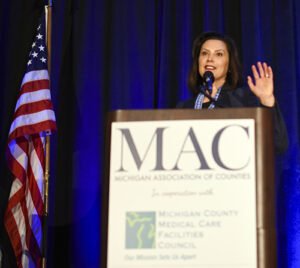 MAC and MCMCFC are wrapping up preparations for the 2022 Michigan Counties Legislative Conference that starts Monday, March 21 in downtown Lansing.
MAC and MCMCFC are wrapping up preparations for the 2022 Michigan Counties Legislative Conference that starts Monday, March 21 in downtown Lansing.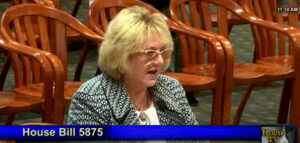 Michigan needs to extend the sunset on the current county maintenance of effort (MOE) rate for county medical care facilities (MCFs), so the rate remains capped and predictable, the executive director of the Michigan County Medical Care Facilities Council told legislators this week.
Michigan needs to extend the sunset on the current county maintenance of effort (MOE) rate for county medical care facilities (MCFs), so the rate remains capped and predictable, the executive director of the Michigan County Medical Care Facilities Council told legislators this week. In the latest live episode of Podcast 83 on Monday, March 14, host Deena Bosworth, subbing for Executive Director Stephan Currie, reviewed key county issues in play at the State Capitol with Meghann Keit-Corrion, governmental affairs associate.
In the latest live episode of Podcast 83 on Monday, March 14, host Deena Bosworth, subbing for Executive Director Stephan Currie, reviewed key county issues in play at the State Capitol with Meghann Keit-Corrion, governmental affairs associate. More state investment is vital for local public health, the head of the Michigan Association of Local Public Health (MALPH) told the House Appropriations Subcommittee for the Department of Health and Human Services this week.
More state investment is vital for local public health, the head of the Michigan Association of Local Public Health (MALPH) told the House Appropriations Subcommittee for the Department of Health and Human Services this week. The National Association of Counties provided the following update this week on the “state of play with Congress and the White House on a potential recission (or clawback) of ARP Recovery Funds for counties:
The National Association of Counties provided the following update this week on the “state of play with Congress and the White House on a potential recission (or clawback) of ARP Recovery Funds for counties: Connect Michigan, a nonprofit working with the state to engage in a comprehensive broadband planning and technology initiative as part of a national effort to map and expand broadband, will host a
Connect Michigan, a nonprofit working with the state to engage in a comprehensive broadband planning and technology initiative as part of a national effort to map and expand broadband, will host a  Please join county elected and appointed officials from across the country in Adams County, Colo., for the National Association of Counties (NACo) 2022 Annual Conference & Exposition. The conference is the premier national opportunity for counties to exchange cutting-edge practices, elect the association’s leadership and shape NACo’s federal policy agenda for the year ahead.
Please join county elected and appointed officials from across the country in Adams County, Colo., for the National Association of Counties (NACo) 2022 Annual Conference & Exposition. The conference is the premier national opportunity for counties to exchange cutting-edge practices, elect the association’s leadership and shape NACo’s federal policy agenda for the year ahead.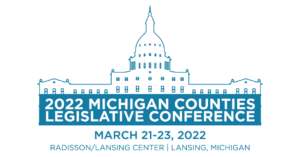 County officials have through March 15 to register for the 2022 Michigan Counties Legislative Conference in Lansing. While on-site registrations will be accepted starting on day 1 of the conference, March 21, the member fee will rise to $435, as compared to the early-bird rate of $395.
County officials have through March 15 to register for the 2022 Michigan Counties Legislative Conference in Lansing. While on-site registrations will be accepted starting on day 1 of the conference, March 21, the member fee will rise to $435, as compared to the early-bird rate of $395. Michigan ranks among the bottom half of states for broadband connectivity, an unfortunate fact that was all too apparent during the early months of the COVID-19 pandemic. The silver lining in this digital deficit, however, is that it now positions the state well in terms of federal funding assistance to connect homes and businesses.
Michigan ranks among the bottom half of states for broadband connectivity, an unfortunate fact that was all too apparent during the early months of the COVID-19 pandemic. The silver lining in this digital deficit, however, is that it now positions the state well in terms of federal funding assistance to connect homes and businesses.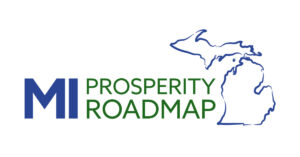 With Friday marking the 1-year anniversary of the passage of the American Rescue Plan Act (ARPA), Dan Gilmartin, Executive Director and CEO of the Michigan Municipal League, and Stephan Currie, Executive Director of the Michigan Association of Counties, issued the following statement on behalf of the
With Friday marking the 1-year anniversary of the passage of the American Rescue Plan Act (ARPA), Dan Gilmartin, Executive Director and CEO of the Michigan Municipal League, and Stephan Currie, Executive Director of the Michigan Association of Counties, issued the following statement on behalf of the  Senate bills that would privatize the state’s mental health system remain on the Senate floor, as MAC and other organizations work to defeat the legislation, which is strongly backed by Senate Majority Leader Mike Shirkey (R-Jackson).
Senate bills that would privatize the state’s mental health system remain on the Senate floor, as MAC and other organizations work to defeat the legislation, which is strongly backed by Senate Majority Leader Mike Shirkey (R-Jackson). The Michigan Department of Health and Human Services (MDHHS) Office of Child Welfare Services and Support released new program instruction this week regarding substance abuse testing. The new instruction discontinues the use of Averhealth for substance use testing.
The Michigan Department of Health and Human Services (MDHHS) Office of Child Welfare Services and Support released new program instruction this week regarding substance abuse testing. The new instruction discontinues the use of Averhealth for substance use testing.
 Legislation that would provide grants to local pension systems passed the Michigan House of Representatives on Tuesday with a 71-33 vote.
Legislation that would provide grants to local pension systems passed the Michigan House of Representatives on Tuesday with a 71-33 vote.  Long-needed legislation to reimburse local governments from property tax losses due to an exemption for veterans moved to the Senate floor this week.
Long-needed legislation to reimburse local governments from property tax losses due to an exemption for veterans moved to the Senate floor this week. County leaders were briefed Wednesday by state officials on the latest information regarding money from the National Opioid Settlement during a
County leaders were briefed Wednesday by state officials on the latest information regarding money from the National Opioid Settlement during a  A bill introduced this week would ensure the maintenance of effort (MOE) rate to support county medical care facilities remains capped and predictable.
A bill introduced this week would ensure the maintenance of effort (MOE) rate to support county medical care facilities remains capped and predictable. 





